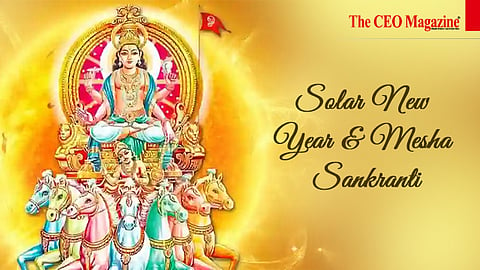
- News
- Women
- Magazine
- IndustryIndustry
- InsightsInsights
- Success Stories
- PublishPublish
- ContactContact
- Media KitMedia Kit

Solar New Year Or Mesha Sankranti
Solar New Year Or Mesha Sankranti
Sankranti or the Solar New Year is an auspicious day for Hindus. This festival also marks the commencement of the summer season. After the sun enters into the Aries or Mesha Rashi it is considered the first day of the solar cycle that is celebrated as Solar New Year or Mesha Sankranti as per the Hindu calendar.
On this day devotees seem to visit sacred places like Puri Jagannath, Samaleshwari, Cuttack Chandi and Biraja temples. In many states of India, Solar New Year is known by different names like Maha Vishuva Sankranti and it is also celebrated in various forms. This year, the Solar New Year or Mesha Sankranti 2025 will be observed on 14th April 2025, Monday.
To know about more festivals being celebrated in the month of April, do visit..
Sun takes one year to transit through all the twelve signs from the fire sign Aries to the water sign Pisces, also known as Meen Rashi. According to the Hindu solar calendar, the Sun stays in each zodiac sign for one month.
When the Sun enters again into the first sign Aries or Mesha Rashi, it marks the first day of the Solar New Year which is commonly known as Mesha Sankranti in India.
On this day, devotees wake up before sunrise and take a holy bath in Ganga, Jamuna and Godavari.
Devotees should offer Jal (water) to the Surya Dev along with Surya Namaskar.
It is very important to perform all the rituals of Sankranti during the period of Punya Kaal Muhurat.
Devotees from every community follow the rituals of the Sankranti and chant mantras and slokas on this day. The most chanted mantra is “Om Grehini Suryaya Namaha!”
In some communities, a special drink is prepared called Panna which is consumed after the puja as a prasad.
In several places, lord Shiva, Hanuman, Vishnu and the goddess Kali is been majorly worshipped for well-being, prosperity and peace.
On this day devotees follow Satvik food which includes, fruits, juice, nuts and a few more things.
It is believed that doing charity on this day will seek you with blessing so devotees donate food, clothes, money to the poor or to a needy person. Donating red and yellow colour clothes is considered to be very auspicious as it symbolizes the colour of the Sun.
It is also recommended to perform personal rituals on this day, doing so, can help you get rid of the ill effects of negative planets.
Universally the New Year is celebrated on 1 January according to the Georgian calendar. On the other hand, according to the lunar calendar, again it is the time to celebrate the New Year.
Solar New Year or Mesha Sankranti marks the New Year celebration for Hindus across India. However, this festival is also known by different names as well as there are many variations in celebrating it.
Talking about Western India, in Odisha, this festival is celebrated as Pana Sankranti, in Assam, it is celebrated as Bihu and in West Bengal, Solar New Year is celebrated as Poila Baisakh.
Taking you to the Southern part of India, in Tamil Nadu, this festival is celebrated as Puthandu while in the Northern state Punjab, the Solar New Year or Mesha Sankranti is celebrated as Vaisakh.
Solar New Year is the auspicious festival that marks the beginning of the New Year for Hindus. The Solar New Year begins when the Surya Dev completes one year by transiting through all the zodiac signs.
It is said that one can get rid of all sins by doing charitable work or helping on this day. It is believed that the ten minutes before and after Sankranti is very important for performing all the rituals and prayers.
It is said that during this time, the god sun (Surya dev) removes the darkness and makes your life bright.
We wish you all a very Happy Solar New Year and Mesha Sankranti! If you are wondering about Solar New Year, then you are at the right place. If you have any thoughts or queries on Solar New Year, please reach out to us; we appreciate our reader's feedback.
Thank you for your valuable time in reading this article, and we look forward to hearing from you.
Follow us on Google News
